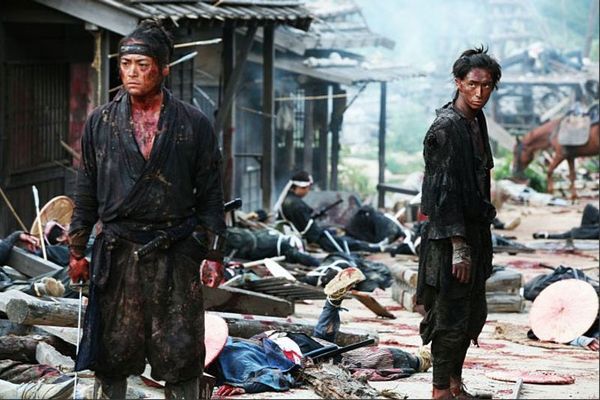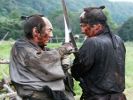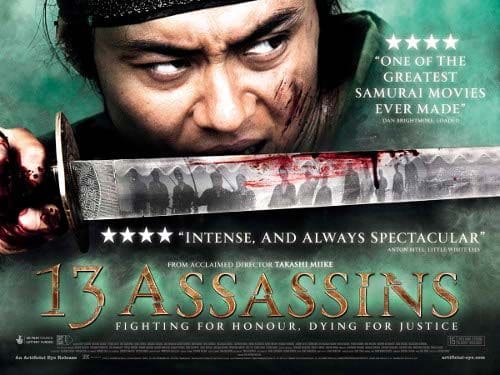Eye For Film >> Movies >> 13 Assassins (2010) Film Review

13 Assassins begins with a defiant act of hara-kiri - the ritualistic act of suicide performed by the shamed samurai. Begin as you mean to go on, Mr Miike. However, this act is not performed in front of the samurai’s master, as is the custom, it is performed in solitude and silence. An act of rebellion against a tyrannical Shogun-in-waiting, Lord Naritsugu – more of him later. Another surprising accompaniment to this act is the lack of abundant gore, of preposterously spurting wounds and sadistic horror.
This is, after all, a film by Takashi Miike, that irrepressibly prolific enfant terrible of Japanese cinema – renowned in the West for deliriously violent films like Audition and Ichi the Killer. Is this evidence of a mature Miike? There is certainly a reverence afforded to the jidai-geki genre here - of which there has been a welcomed return to in Japanese cinema in the last decade, with the excellent Twilight Samurai and Takeshi Kitano’s fresh interpretation of the popular Zatoichi series providing particular highlights. If you’re watching in hope of the savagery and brutality that accompanies the more controversial of Miike’s films, then don’t worry, there’s still plenty to be found here. Heads will roll.

The film is set-up expertly and efficiently. The unrelentingly cruel and merciless Lord Naritsugu is getting closer to the position of Shogun. His misdeeds are given explicit description here: rape and murder give way to even more sordid horrors which will have many shielding their eyes. It’s safe to say, he’s as deplorable a bad-guy as they come. His chief lieutenant – Hanbei – is given more subtle characterisation as his long-suffering samurai, who is aware of the evils performed at the behest of his master, but is too loyal to the code of the samurai retainer to do anything other than serve dutifully.
The experienced samurai Shinzaemon is soon hired to get rid of Naritsugu for the greater good of a society fleeing from the bloodshed of clan war that had plagued it for centuries. It so happens that Shinzaemon and Hanbei were old sparring partners from the same Dojo (a sort of training-school for samurais) and have a healthy distaste and envy for one and other. Set-up complete.
What follows can only be described as good, old fashioned fun. Heads are lopped off, stomachs sliced open, cows set alight, villages left in tatters and, most importantly, wrongs are righted. Shinzaemon sets about assembling his team of assassins and, in a homage to Kurosawa’s peerless Seven Samurai (and Toshiro Mifune), pick up a daft, yet charming non-samurai along the way to help them in their quest. They could certainly do with all the help they can get. As they set-up camp in a village that Naritsugu and his blundering entourage must pass through, they crunch some numbers in preparation of the battle to come. No matter how you look at it, 13 against 200 doesn’t stack up. People are going to die.
And die they do. In a final battle sequence lasting some 50 minutes, they die rather frequently, yet their deaths are not glorified in the slightest. There’s no polish to the swordplay here, the samurai die battered and bloodied in the mud. However, that’s precisely the point. The samurai’s life is only worth living once he realises precisely how worthless it is. One must accept death as an unalterable truth, and in the samurai’s line of work dying in the mud is as honourable and dignified as it gets.
The battle scene is excellently well choreographed as our assassins use the tactical advantages of the village to fend off the typically faceless multitudes of Lord Naritsugu’s entourage. Clever wooden gates trap the hordes into the narrow streets of the village as the assassins fire death at them from the rooftops; the aforementioned burning cows are let loose to rampage their way their way down these streets as if it were Pamplona. The camera work is tight and rapid, helping to make these sequences thrillingly visceral. Before long 45 minutes have passed and the numbers, on both sides, are rapidly diminishing. Time for a showdown.
In the end Shinzaemon must face up to Hanbei, before he can kill Naritsugu. This duel between the two old enemies, once sparring partners now characterising the opposing forces at work in the demise of the samurai era, is what we’ve been building up to. As is required of a proper samurai epic, the fatalistic melancholy of the dying class and hypocrisy of the feudal era it supported, is given voice in the sloppy fight that ensues. There is no masterly, well choreographed sword play. They briefly draw equal before Shinzaemon sucker punches Hanbei by kicking mud into his face. Several beheadings follow, I’ll leave the particulars to your own imaginations.
If there is any criticism to be brought upon the film, it rests in the lack of characterisation. At an hour shorter than Kurosawa’s aforementioned genre benchmark, and with almost double the amount of samurai, it’s really hard to get too much of a feeling for the samurai that will sacrifice themselves in their dissent against their despotic lord for the greater good. Shinzaemon and his womanizing, gambling nephew are given some consideration. So too are Hirayama – as Sinzaemon’s stoical, yet talented student – and the amiable hunter Koyata, who they meet along the way, however it’s few and far between.
This is a minor concern however, and comparing anything to Seven Samurai is a bit redundant. Ultimately, what you see is what you get in 13 Assassins - lots of blood and death and despicable cruelty. Miike keeps us engaged with more than blood and thunder, though. There’s plenty to smile at, from the blackest of humour to gentle laughs from the buffoonery of Koyata. Added to this, Miike’s assassins’ sense of duty, honour and defiance against the greatest of odds make sure this ticks all the required epic adventure boxes. More importantly than anything though, this is a film that is buckets of fun from start to finish.
Reviewed on: 07 Sep 2011



















